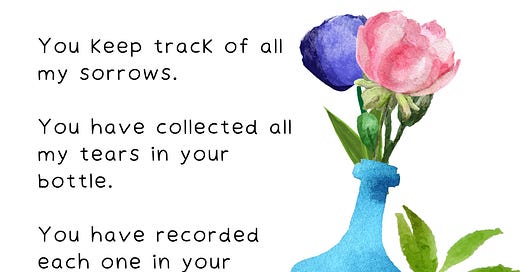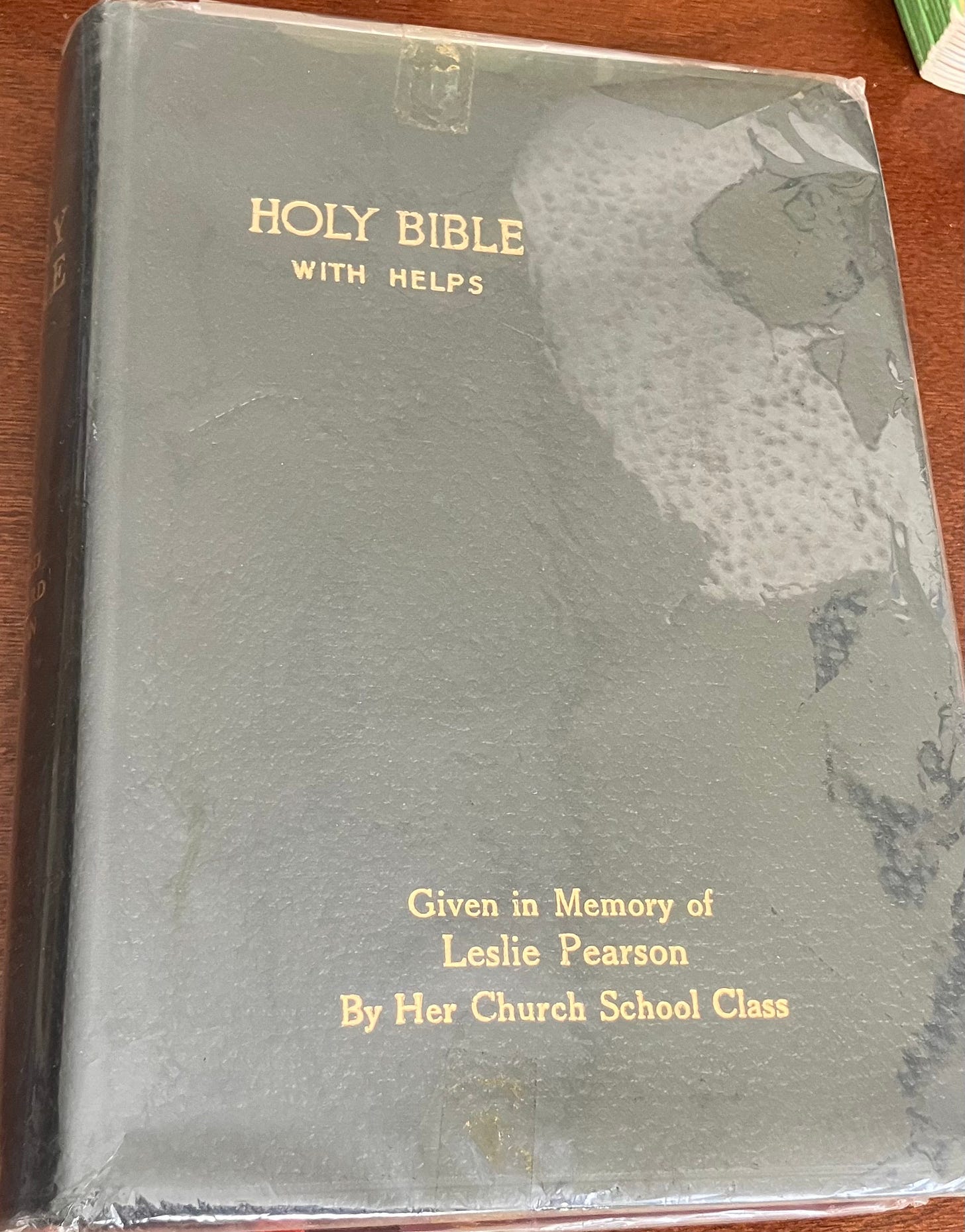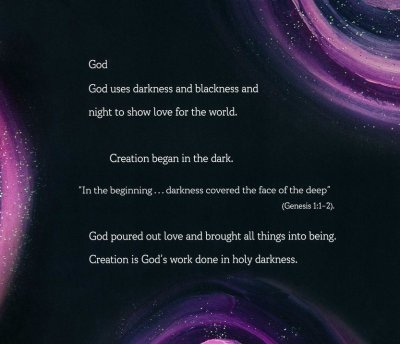Dear Friends,
I’ve just about caught my breath following Godly Play-related travel, although it does seem like every time I think there’s room to pause, it’s actually just a few days before things pick back up again.
It’s like people say – adulthood is just saying over and over again, “I think things are finally slowing down.”
The world keeps turning. The world spins madly on, as the Weepies put it. But we have to choose to press pause.
Luckily, the All Hallowtide Triduum is around the corner, and reflecting on that thin place – our closeness to death, those we’ve lost, the Saints who shape our faith – can serve as the perfect opportunity for us to find that stillness.
Making Room for Grief
I’m ready to stop navigating the Track 1 and Track 2 aspects of the lectionary, but as I sit down to think about grief, something I immediately notice is that both the Old Testament passages this week, both offer us insight into God and grief.
The first passage comes from Job – God speaks to him and to his friends out of the whirlwind. Though God is not actively addressing Job’s losses and griefs in this passage, we know the story: Job has lost everything. And while he has mostly persevered, he has really reached the end of his rope. Meanwhile, God has been watching. Even in silence, God has been present to Job’s suffering the entire time.
The other passage this week is from Isaiah. Reading from the Christian perspective that understand this passage as pointing towards Jesus, we are reminded that we do not carry our afflictions alone. Yes, Christ takes on our sin, but the selection begins first with “Surely he has borne our infirmities and carried our diseases” – and those things come with their own grief. The grief of loss and the grief of what could have been.
And there are yet more kinds of grief.
This past Sunday, I was talking to one of my early elementary-age church school children about dead grandparents. Her grandfather died this summer. The grandfather I was close with died when I was just a little older than her oldest sibling – and before my youngest sibling was born. When I mentioned that piece, she looked startled. And it made me think about the piece of that grief in my family, the grief of that not-knowing or not-remembering.
But grief is also an invitation. It is a place where stories can begin, not just where they end.
Many of my favorite media recommendations for this venue are primed to talk about grief right now, as we move towards All Hallowtide. Godly Play’s Mess Makes Meaning kicked off October with a “Grief with Children” episode,
meanwhile, And Also With You is asking the question, “What Is Grief?”
and, looping back to my week off from the newsletter, Godly Play’s new practice-focused (vs. faith at home/family-focused) podcast begins with an interview with our founder Jerome Berryman, recorded a few months before his death this August.
This last piece is a helpful link to what I said above – that grief is not just a place of foreclosure, the end of a story, but a place where stories can begin.
And so, as we prepare for All Hallowtide, I wonder what stories you want to tell?
A Sacred Story Assortment
When I talk about telling stories, I imagine many things. Family lore, yes. Name saints, sure. But also, faithful people whose stories describe a shared passion. Stories about parishioners who have passed on but made your worshipping community what it is.
Tell the stories in pictures, in words, in objects.
Tell them with maps and historical documents.
Play the songs. Polish the silver.
And when you really want to tell a story but can’t find the words, choose someone else’s to begin. Maybe your family’s grief story includes miscarriage or stillbirth and you need a story like Dear Star Baby. Maybe grief lives in the gaps of memory loss, even as the beloved person is still there (I offer you A Doll for Grandma or Grandpa Green).
Or, maybe you need a story that doesn’t exist yet. Or you want to know what story is still inside. And so we listen.
Skeletons, Ghosts, & Ghouls
The haunts of Halloween – the skeletons and ghosts and creepy clowns – are scarier than death in some ways, and a different kind of scary than death in others. Still, we often willingly invite in the things that risk nightmares in ways we do not invite in our worries about death and loss. I wonder what would happen if we reversed that balance?
From the adult perspective, I am taken by this 2014 writing by the Rev. Laurie Brock, “Being Afraid of the Dark.” Brock points us towards the original Christian skeletons – relics – as well as toward the more festive elements of our sacred feasts – food, drink, fire. But, most critically, she writes:
The holy days of Hallowtide invite us into the darkness of life. Darkness is not evil; it is instead that part of our life that is less clear, less steady, less comfortable. The language of spirits, of death, of grief, and of fear are intertwined with the language of prayer, of silence, and of hope. The symbolism of the cross is alive - death and life intersect. Light and dark are part of the same whole. We as Christians do not escape fear, unrest, and darkness. It exists as part of life. And when we are in the darkness, we are often scared. Things that we hear and see and touch in the darkness unnerve us. We can feel alone and abandoned.
And that is a faithful response.
So let us be together in God’s Holy Darkness. Let us set the altar of remembrance of those we love alongside the table of remembrance, the eucharistic meal. Tell the strange and spooky stories – the valley of the dry bones coming to life, Lazarus raised from the dead like some holy zombie – and notice God’s power of reversal so long before the resurrection that founds our faith.
Resource Roundup
This week’s resource roundup is going to be heavy on the many updates I got while away on my most recent Godly Play adventure. There’s been a lot happening behind the scenes over there that’s ready to make its public appearance! I’ll probably get started on Advent resources in the next week or two.
As noted above, in addition to Mess Makes Meaning, the Godly Play Foundation is starting a second podcast. Consider them two sides of the same coin – the practical pieces for daily life at home and the bigger picture of our theory and theology.
If you haven’t ordered it yet, the expanded and revised Guide to Godly Play Volume 8 is ready for pre-order! It’s been such a labor of love and I’m especially proud of the Equity Audit team’s work ensuring all of the stories in this volume, as well as the new art.
You may have heard a few things about Everyday Godly Play – the program where Mess Makes Meaning originated – but the pilot phase is over and the fine tuned parts are becoming public offerings. That includes the beautiful Christmas Countdown Nativity set and the Affirmation Cards available from Godly Play Resources, as well as the new online Family Story Circles (the next one is tomorrow evening!).
A special Bird’s first impression about those story circles – I got to see snippets of the videos the Creative Director Joy Studer has been making and apparently she’s basically become a professional videographer and producer in the course of this project – the story videos are beautiful and when you register for the Zoom calls, you get a story guide and a link to the video.To reiterate all of this Everyday Godly Play stuff, make sure you’ve filled out their interest form to get all the updates, whether you’re a parent or a program director or anything in between. Now that the program is moving out of its pilot phase, there will be a lot of new opportunities for everyone to engage with their work.
That’s all for now!
Peace to you all this week and always –
Bird







